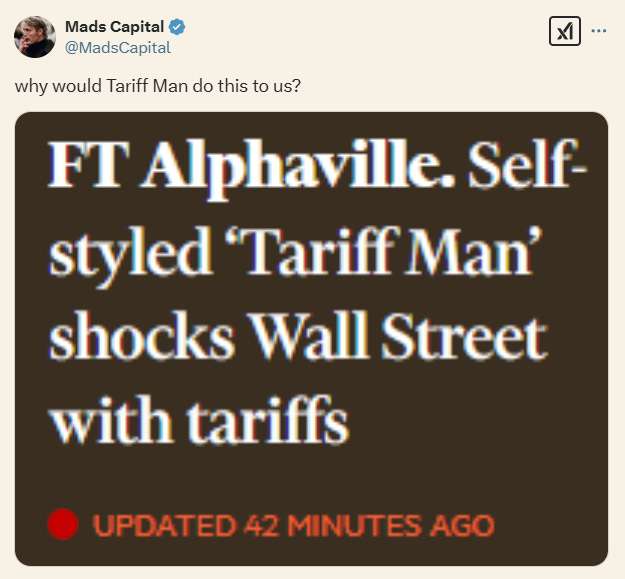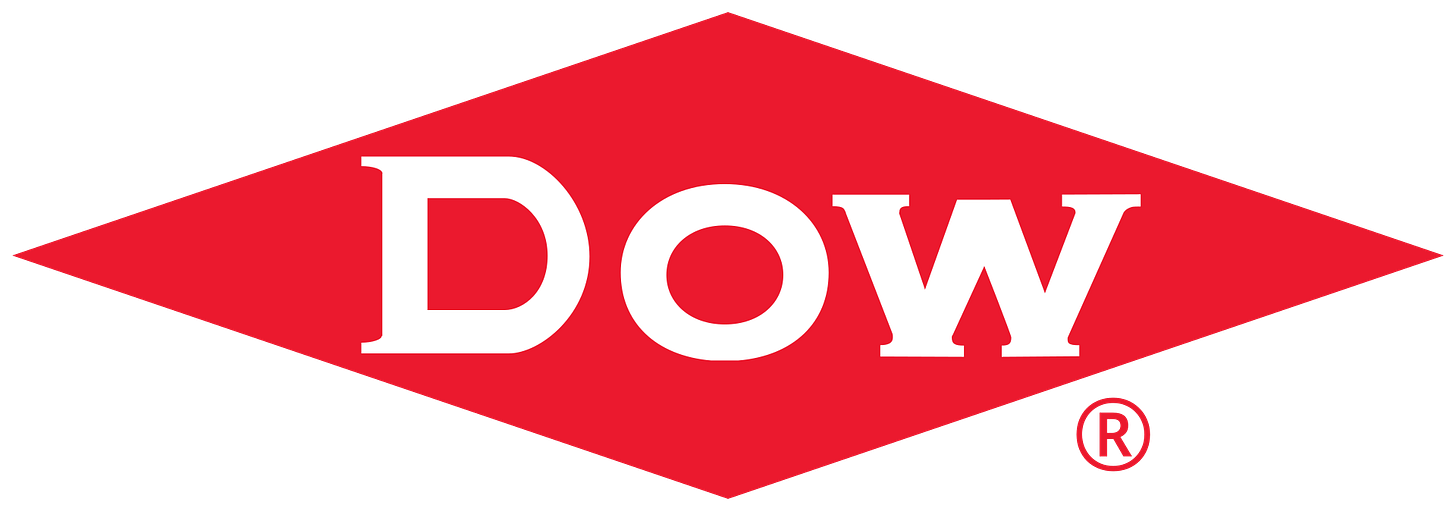Over the past few weeks, I’ve combed through a few dozen transcripts of various companies. There seems to be a case for growing optimism for an improved business environment. It’s also interesting what some have said regarding potential tariffs and their ability to handle them, if or when they come.
I was saving this post for next weekend, but now, potential tariffs have turned into real tariffs and its appropriate to release now. According to the Wall Street Journal, “Effective Tuesday, the U.S. will impose a 25% levy on imports from Canada and Mexico, a 10% tariff on energy products from Canada, and an additional 10% tariff on China.” Will slightly improving sentiment swing back the other way? Will the new tariffs (and retaliatory tariffs) be more than business wants to handle?
Please enjoy the below snippets and we’ll see if any of these companies are singing a different tune three months from now.
Thermo Fisher Scientific - Q4 2024 Earnings Call (January 14, 2025):
“So we thought about the environment where, today, there’s a lot of ideas being discussed but not really yet materialized into any particular policies. What I’m very excited about is the business environment, particularly in the U.S., is going to be much more business-friendly with much more of a focus on economic growth. I’m excited that … from an M&A perspective, we’re likely to see a much more reasonable environment from a regulatory perspective.
And when I think about what our company does and what our customers do, science and medicine are unbelievably important, and they’re not discretionary. And therefore, we’re excited about it, and we'll navigate whatever the environment holds.”
—Marc Casper, Thermo Fisher CEO
Visa Inc. - Q1 2025 Earnings Call (January 30, 2025):
“We’re optimistic. Our clients are optimistic. I think what we’ve heard so far is that the administration wants to move quickly to reduce and simplify regulations, and they’re doing it kind of with a goal of spurring economic growth, efficiency, innovation, all very good things. So we’re optimistic that these changes are going to reduce the regulatory burden for businesses in general in America, which is good for America and ultimately should be good for Visa.”
—Ryan McInerney, Visa CEO
Mastercard Incorporated - Q4 2024 Earnings Call (January 30, 2025):
“Now we have a new administration here in the United States. Confirmations haven’t fully been done yet, but the Secretary of Treasury is confirmed and so forth, so some of the key partners that we would normally engage with. And we have an administration coming in that is touting a business-friendly approach, and that’s fundamentally good for us. The conversation around tariffs and the intended use of tariffs that's been discussed, we have to see how it plays out and what will happen. It's also clear, we're not in the import-export industry.”
—Michael Miebach, Mastercard CEO
Automatic Data Processing, Inc. - Q2 2025 Earnings Call (January 29, 2025):
You asked about the new administration and anything that’s changed. I think it’s too early to call whether or not we’re seeing a demand change as a result of the new administration. But the good news is there seems to be a lot of activity, and change is good for ADP. As companies navigate change, we’re there to help them stay compliant. And so we’re looking forward to helping our clients sort through what undoubtedly seems to be quite a bit of change.
—Maria Black, Automatic Data Processing CEO
Brown & Brown, Inc. - Q4 2024 Earnings Call (January 28, 2025):
“From an economic standpoint, there were no major changes for the markets in which we operate as compared to the last few quarters. Many business leaders have shifted from being cautious to cautiously optimistic. In addition, we did not see companies materially change their levels of investment, as they’re still hiring and growing their revenues generally at levels similar to the second and third quarters of 2024. Overall, the economies in which we operate are relatively stable, which we view as a good backdrop for our growth opportunities in 2025 and beyond.”
—J. Powell Brown, Brown & Brown CEO
Landstar System, Inc. - Q4 2024 Earnings Call (January 29, 2025):
“I’d like to think that we’re in the beginning of the next cycle. I could also argue that we’re at the end of the prior cycle. So somewhere at that kind of bottom-ish point, I think sentiment is clearly more positive. We hear that from agents. We hear that from customers.
I think that there are some overtones from the election that are part of that positive sentiment and sort of a pro-America, pro-North American stance there. But certainly, there is more bullishness in the sentiment that we hear. At the same time, we’re all looking for a level of clarity from D.C. these days on policy. Certainly, anything that is pro-U.S. or pro-North America is good for Landstar.”
—Frank Lonegro, Landstar System CEO
Covenant Logistics Group, Inc. - Q4 2024 Earnings Call (January 24, 2025):
I think that the environment is getting better. I think optimism is getting better. I think that when people are optimistic, they start buying stuff even more.
I think that, that is in the process of happening or starting to happen or whatever word you want to use there. But I think it is definitely part of it. Optimism, I think that people are banking on what happens with the taxes, whether it’s personal or corporate is going to generate more activity in the United States. I was thrilled to see what automotive and Jeep is doing. And I think that’s the beginning what we’re getting ready to see from an economic environment, which produces freight for us.
—David Parker, Covenant Logistics founder and CEO
Dow Inc. - Q4 2024 Earnings Call (January 30, 2025):
[responding to a question about Canada and tariffs]
“I mean I think the most important thing is what we’re doing right now, which is engaged with the administration on providing data for ourselves and also for the industry to understand the situation. And we’re starting to see every day … more refinement on what’s happening.… We’re relatively balanced with Canada. We trade both ways with Canada, a little bit more coming into the U.S. from a finished product standpoint, but we have product that moves both ways.
So trying to just have an overall picture of what the energy complex and the petrochemicals complex looks like there so that we don’t create unintended consequences. And I don’t think it’s the administration’s view to do something that’s going to hurt the global economy. I think they want to try to create the situation where we continue to have growth and investment here.”
Teledyne Technologies Incorporated - Q4 2024 Earnings Call (January 22, 2025):
In terms of the DOGE efficiency, I think it kind of would favor us, partially because … most of our defense businesses … is purchase order businesses with products that we have rather than protracted appropriations. We also are in unmanned platforms. If you take our unmanned air vehicles, ground vehicles and underwater vehicles, which we have all 3, it’s almost $400-plus million. Our platforms are unmanned. A lot of our sensors go on those and versus manned platforms. And a lot of our products are also standard products rather than very highly customized solutions. So I think we will be okay.
—Robert Mehrabian, Teledyne CEO
Amphenol Corporation - Q4 2024 Earnings Call (January 22, 2025):
Look, specific to tariffs, let me just say this. I mean, this is not a new topic. We dealt with tariffs back from the U.S. back in, I think it was 2017, those tariffs were mostly directed at China, but not only China. And I think what we saw in that time is our team did a fabulous job of mitigating the impact of those tariffs through a wide variety of measures. There was not a one-size-fits-all solution.
Underlying all of that is the backdrop that we tend to make our products in the regions where our customers buy them, not 100%, but that we tend to always try to be close to our customers. And sometimes our customers are making things in regions and shipping them into the U.S. or into Europe, and we try to be close to those customers wherever they're making them.
But if you really get to the essence of why we were so successful in mitigating the last phase of tariffs, it comes down to that unique entrepreneurial organization that I mentioned earlier.…
And what that means is not that they kind of guess where the policy is going, but rather that they make sure that their operations are as agile as possible. And we run a company that's based on the principle of agility, of entrepreneurship, the flexibility, the reactivity. And that positions us extremely well when there are these kind of unpredictable situations that are coming.
—Adam Norwitt, Amphenol CEO
Fastenal Company - Q4 2024 Earnings Call (January 17, 2025):
[W]hen I talk about the improving sentiment, what I’ll say is in November, when we reported sales, I mean, there’s clearly postelection a step-up in terms of what the RVPs are feeding back to me about people are feeling a little bit better about things. I think there's just the—there’s value in knowing. And I think that a lot of uncertainty was perhaps dissipated once we got through the election.
I will say that the tone from the RVPs was fairly universal about that sentiment continuing to get better heading into next year. And so that’s a fairly qualitative read on things. But nonetheless, I’ve, over time, learned to really respect the feedback of the RVPs because they really do feel what’s going on in the marketplace in real time and pretty intimately.
Please Subscribe
If you enjoyed this content, please share and subscribe.
Other Recent Writing
Mastercard In the Flows
Victor Emanuel
Disclaimers
The content of this publication is for entertainment and educational purposes only and should not be considered a recommendation to buy or sell any particular security. The opinions expressed herein are those of Douglas Ott in his personal capacity and are subject to change without notice. Consider the investment objectives, risks, and expenses before investing.
Investment strategies managed by Andvari Associates LLC, Doug’s employer, may have a position in the securities or assets discussed in any of its writings. Doug himself may have a position in the securities or assets discussed in any of his writings. Securities mentioned may not be representative of Andvari’s or Doug’s current or future investments. Andvari or Doug may re-evaluate their holdings in any mentioned securities and may buy, sell or cover certain positions without notice.
Data sources for all charts come from SEC filings, Koyfin, and other publicly available information.

















